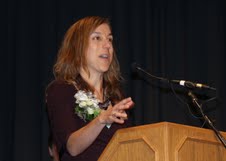I was honored to be part of the Vermont Teacher of the Year process this year. After interviews with the State Board of Education, essays, and observations I was one of three Vermont finalist teachers. Luke Foley of Northfield Middle and High School was named the Vermont Teachers of the Year for 2014, and I was the alternate. I had the opportunity to speak at the ceremony, and here are my comments:
Thank you so much, Secretary Vilaseca. It is truly an honor to be here with this group of innovative teachers, and supporters of public education.
I thank the Vermont Agency of Education, The Board of Education, the Teacher of the Year committee, and the Northfield community for providing this opportunity to celebrate Vermont’s teachers and to bring teacher voice and leadership to a wider platform. If we are to truly make schools better, it must be from the inside out, using teachers to shape, lead and innovate school policy and decision making. There are thousands of teachers across this great state who are making a difference in the lives of our children. We must ask for their input. Give them the tools to lead and create better schools. Help them get the resources they need to teach and to be heard. And support them once they are in the classroom with mentoring programs, collaborative and supportive learning environments, and professional compensation.
Our society is changing rapidly and our schools should be as well. Teachers need the tools to create innovative, personal, and individualized learning grounded in local communities. We need to provide authentic learning opportunities through leadership and service learning to engage our students. Our students (and schools) should not be judged on the scores of one test, one day, in one hour, but in multiple and varied ways, over time. Then we can consider the whole child, and reintroduce humanity into education—wide swaths of integrated, in-depth learning, unhurried, supported, guided and motivating.
Information is free and accessible. Instead of being the sole instruments of information, teachers are facilitators in growing flexible, creative, critical thinkers who can solve the complex problems our world is facing. Our students need experience with this. Service learning and school wide leadership experiences can transform school climates, promote learning between grade levels and ages, increase engagement, motivation, feelings of community, and engage students in higher level learning through authentic experiences in their schools and communities. The way our communities see our schools and kids are also transformed—communities are deeply involved in their schools and see children and teenagers as allies, partners and instruments of hope that can solve complex problems.
Isn’t that what we need right now, especially in today’s political climate? Thank you, and congratulations, Luke.

